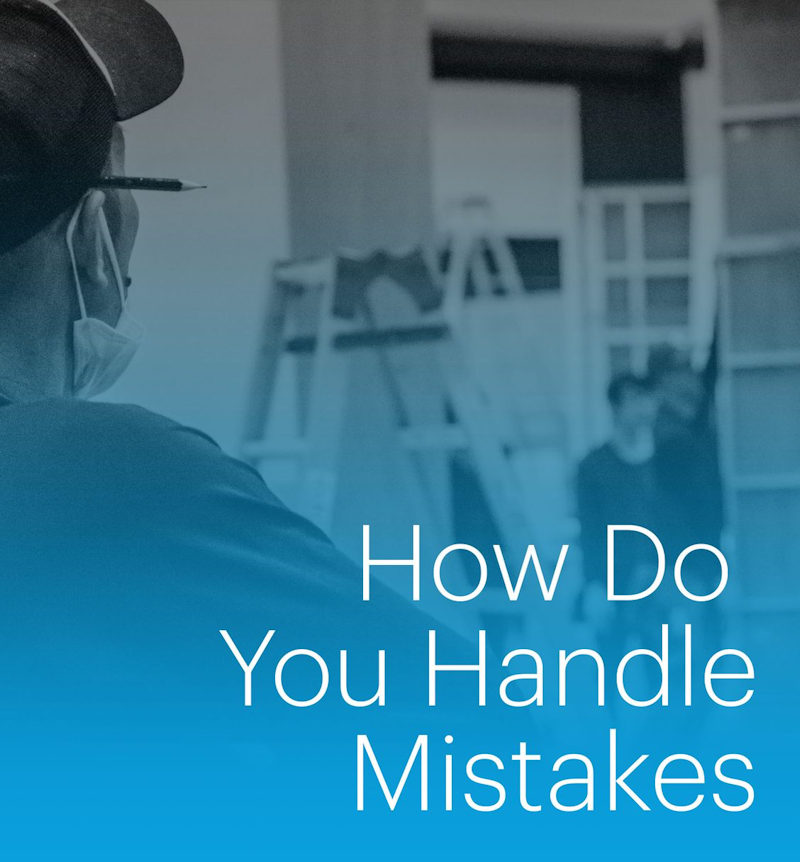
“Good judgment comes from experience, and experience comes from bad judgment.”
Did Mark Twain say this, or did Will Rogers? This quote could have just as easily come from me. We all make mistakes. We’re human. But the big question is: how do we handle mistakes?
When I asked Chat GPT this question, I was told: As an artificial intelligence language model, I do not have feelings or emotions, so I do not “handle” mistakes like humans do. Well, that was helpful.
On the other hand, the last line was very important: humans make mistakes—all of us. Ultimately, the most important thing is to approach mistakes with a growth mindset and use them as opportunities to learn and improve.View Preview
But it doesn’t help assuage the feeling in the pit of your stomach when you’ve made a mistake. Guilt. Shame. Regret. Anxiety. A totally painful period that sometimes lasts longer than it should, between when you notice a mistake and when you learn from it.
Don’t play the Blame Game
Taking responsibility upfront for any mistake made on your watch, particularly one with consequences beyond your company, is the first step to learning and growing. If you think you made a relatively serious mistake, you might have to ask someone—an account manager or a finance person— for help figuring out how to handle it. Learning to ask for help is part of successfully handling mistakes.
Cultural Differences
As most of you know, I’m from Iowa, America’s heartland. We Iowans make mistakes, say some bad words, kick the dirt, feel bad, and then set about correcting the situation. So when I moved to Japan, people warned me that people in Japan don’t acknowledge mistakes for fear of ‘losing face’ by admitting that something went wrong.
That is true to an extent. However, sometimes that explanation perpetuates stereotypes. Maybe it’s the global economy, but in contemporary business dealings, I find everyone is focused on collaborating to fix the problem. Who or what caused the problem is less important than finding a solution. The communication styles might be less direct and more nonverbal than in Iowa, but the desired outcome is the same.
I found the culture places a strong value on education, diligence, and hard work, so it isn’t unusual that in Japan, people view mistakes as opportunities for learning and improvement. In addition, there is a greater emphasis on teamwork and the sense that the team will work together to avoid making the same mistake in the future. Finally, the culture focuses on collective responsibility, where individuals work together to solve problems and share accountability for mistakes.
I read a recent interview in TIME magazine with Japan’s Prime Minister Fumio Kishida. I didn’t know he spent part of his childhood in the U.S., attending a public school in Queens. Classes were filled with children from diverse cultural and linguistic backgrounds, and Kishida says he found communication “very challenging.” But because of this, he says, “I was reminded of the importance of listening carefully to the views of others,” he says. As a result, he has forged a reputation as a consensus builder.
So How do I (YOU) Handle Mistakes?
In his book, The Power of Regret, Daniel Pink suggests that when you make a mistake and regret it, “avoid wallowing or getting stuck blaming yourself.” Easier said than done, but try to:
-
Acknowledge your mistake
-
Reflect on what you could have done differently
-
Use the substance of that reflection to make different decisions moving forward
-
Go easy on yourself.
For me, there are two categories of mistakes. The first is personal: If I forget to pick up my son from his soccer game, there’s no excuse, and I don’t offer one. Instead, I apologize profusely to my son and my wife and look for ways to restore my “good dad” status. Ice cream, a hike, and some video game time.
The second scenario is business. Although sometimes I want to disagree, I usually accept the client’s perception that I and my company made a mistake. One time the numbers for the correct Pantone colors were transposed. Whether we did that or the client made the mistake doesn’t matter. What matters is correcting the error. Maybe the client claims that it’s our mistake, but if nothing else, not disagreeing saves time spent arguing about who is at fault.
As Fumio Kishida demonstrates, acknowledging and correcting mistakes while respecting the views of others is critical when you’re in a leadership or management position. “The facade of infallibility is often little more than an obstacle to improvement,” Travis Stanton writes. “Our mistakes make us better, smarter, and more efficient, but only if we own up to them and take note of the lessons they can teach us.”
For my part, I make every attempt—usually successfully—to calm the client and appreciate the situation from their point of view. Then, if the mistake impacts others—perhaps interrupting their planned work schedule—I do what I can to rectify the situation with a sincere apology and the offer to help make things right. “Making things right” might be as simple as bringing dinner to the people on the show floor who must work beyond their scheduled hours.
After that, it’s a quick trip back to the drawing board to develop a plan of action. But, of course, the best outcome is when we realize we learned from our mistakes. Or, as a colleague of mine once said, “If Plan A fails, don’t worry; there are 25 other letters in the alphabet.”


Comments are closed.